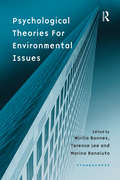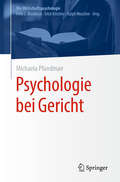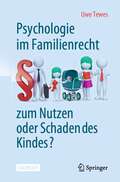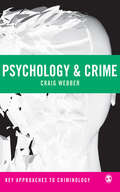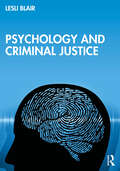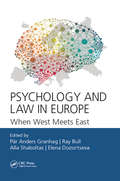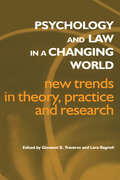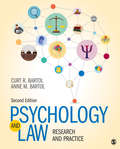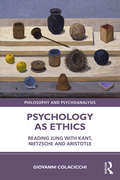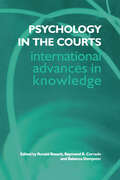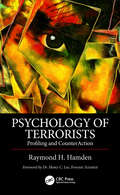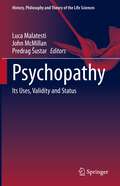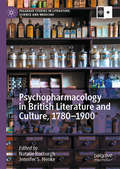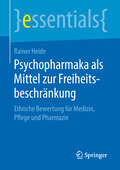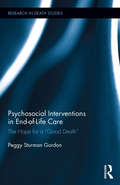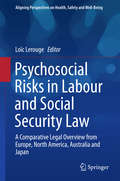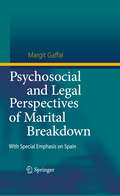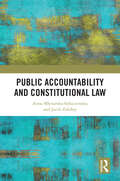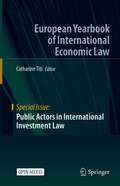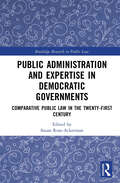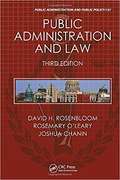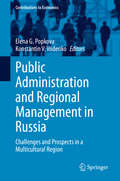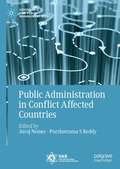- Table View
- List View
Psychological Theories for Environmental Issues (Ethnoscapes)
by Mirilia BonnesEnvironmental psychology is an increasingly important area of research, focusing on the individual and social factors responsible for many critical human responses to the physical environment. With such rapid and widespread growth, the main theoretical strands have often been left unclear and their scientific and practical implications have been underdeveloped. This essential and stimulating book contextualizes and critically analyzes the main theoretical ideas. It compares the different theories, assessing each one's possibilities and limitations, and demonstrates how each approach has been used for the development of knowledge of environmental psychology. The research area infiltrates a broad selection of disciplines, including psychology, architecture, planning, geography, sociology, environmental issues, economics and law. It also offers significant contributions to a wide range of policy evaluations. It will prove invaluable to academics and practitioners from across these disciplines, above all those in planning, environmental studies, human geography and psychology.
Psychologie bei Gericht (Die Wirtschaftspsychologie)
by Michaela PfundmairDieses Buch bietet einen Überblick über die wichtigsten Fragestellungen der Rechtspsychologie, die sich im Rahmen von Gerichtsverhandlungen ergeben. Sie erfahren, wie forensisch-psychologische Gutachter ihre Bewertungen im Einzelfall vornehmen. Im Zentrum stehen Themen wie die Aussagepsychologie und die Familienrechtspsychologie. Wissenschaftliche Grundlagen werden mit zahlreichen Fallbeispielen und Bezügen zur Praxis verbunden. So ist das Buch auch für Leser ohne Fachkenntnisse leicht lesbar. Im Buch erfahren Sie… wie überprüft werden kann, ob eine Schilderung auf wahrem Erleben basiert.wie bewertet werden kann, wer Sorgerecht und Umgang bei einem Kind erhält und was bei Kindeswohlgefährdung passiert.wie abgeschätzt werden kann, ob ein Rechtsbrecher rückfällig wird.wie geprüft werden kann, ob ein Rechtsbrecher schuldfähig oder strafmündig ist.wie die Zuverlässigkeit einer Personenbeschreibung oder -identifizierung bewertet und wie sie verbessert werden kann.welchen psychologischen Effekten Richter und andere urteilende Verfahrensbeteiligte unterliegen. Zielgruppen: "Psychologie bei Gericht“ ist für alle lesenswert, die im weitesten Sinne mit Gerichten arbeiten – von psychologischen Gutachtern über Staatsanwälte bis hin zu Sozialarbeitern, aber auch Studierende und interessierte Laien, die mehr über die Themen und Tätigkeitsfelder der Forensischen Psychologie erfahren wollen. Die Autorin Michaela Pfundmair, Prof. Dr. phil. habil., Psychologin, ist Professorin an der Hochschule des Bundes in Berlin, wo sie zu sozial- und rechtspsychologischen Themen forscht und lehrt. Zu diesen Themenkomplexen publizierte sie international zahlreiche wissenschaftliche Artikel. Zudem arbeitet sie als aussagepsychologische Sachverständige, prüft und supervidiert Personen in der Weiterbildung für Rechtspsychologie BDP/DGPs und ist Vorsitzende der Sektion Rechtspsychologie im BDP.
Psychologie im Familienrecht - zum Nutzen oder Schaden des Kindes?
by Uwe TewesDieses lebenspraktische Sachbuch greift die öffentliche Diskussion über Ungerechtigkeiten im Scheidungsverfahren, gerichtliche Fehlurteile und familienpsychologische Gutachter als „heimliche Richter“ auf. Es beschreibt anschaulich das sehr komplexe System der Zusammenarbeit von Gerichten, Gutachtern, Anwälten, Jugendämtern und Verfahrensbeiständen der Kinder und befasst sich insbesondere mit der Arbeit der psychologischen Sachverständigen.Mit Hinweisen auf fragwürdige Methoden und häufige Fehlerquellen regt dieses Werk auch zum Mitdenken an und ist sowohl ein Plädoyer für ein gesundes Maß an Psychologie im Familienrecht wie auch eine Warnung vor einer Psychologisierung des Gerichtsverfahrens.Zielgruppen für dieses Buch sind Eltern und Betroffene, Juristen und andere beteiligte Professionen sowie psychologische Laien mit einem Interesse an dieser Thematik.Diese vollständig überarbeitete und aktualisierte Neuauflage berücksichtigt die zahlreichen Empfehlungen, Richtlinien, Mindestanforderungen der Fachgesellschaften und der neueren Fachbücher, die seit der Erstauflage erschienen sind.Zum Autor Universitäts-Professor und Diplom-Psychologe (i.R.) Dr. Uwe Tewes war Leiter des Instituts für Medizinische Psychologie an der Medizinischen Hochschule Hannover und mehr als vier Jahrzehnte nebenamtlich als forensischer Gutachter tätig.
Psychology and Crime (Key Approaches to Criminology)
by Dr Craig WebberThis book explores the links between psychology and crime, evaluating psychological explanations of crime and the use of psychology within the criminal justice system. It provides a comprehensive overview that highlights the consequences of crime for victims, offenders and wider society. The book combines classic theory with new developments in eyewitness testimony, offender profiling and forensic psychology. The resulting text offers an engaging and challenging route to a full understanding of key topics, including: the theoretical history of criminal psychology interpersonal violence, sexual violence and deviancy the psychology of crime in groups mass murder and war crimes psychology and the criminal justice system. Psychology and Crime genuinely integrates the two areas with the advanced student in mind, and includes a range of practical devices to support the learning process: chapter overviews; study questions; and further reading. Lively and accessible, it is essential reading for students and academics in criminology, sociology and psychology. The Key Approaches to Criminology series celebrates the removal of traditional barriers between disciplines and, specifically, reflects criminology's interdisciplinary nature and focus. It brings together some of the leading scholars working at the intersections of criminology and related subjects. Each book in the series helps readers to make intellectual connections between criminology and other discourses, and to understand the importance of studying crime and criminal justice within the context of broader debates. The series is intended to have appeal across the entire range of undergraduate and postgraduate studies and beyond, comprising books which offer introductions to the fields as well as advancing ideas and knowledge in their subject areas.
Psychology and Criminal Justice
by Lesli BlairPsychology and Criminal Justice covers the ways that psychology intersects with the criminal justice system, from explaining criminal behavior to helping improve the three criminal justice pillars of policing, courts, and corrections.The book is divided into two parts. The chapters in Part One describe how different areas of psychology can help us understand why people commit crimes. The Basics of biopsychology, developmental psychology, behavioral psychology, social psychology, personality psychology, and psychopathy are presented first in their respective chapters. These initial chapters conclude with a section called Explaining Criminal Behavior that applies The Basics to help explain criminal behavior. Part Two of the textbook begins with a chapter on three topics in psychology that are particularly relevant to the criminal justice system: mental illness, trauma, and substance use. In the remainder of Part Two, there are two chapters each for policing, courts, and corrections. Each of these chapters discusses the ways principles from psychology can help with criminal justice processes, including police investigations and officer mental health, psychological evaluations for court proceedings, juror selection and decision making, behavior change, and the effects of imprisonment.After decades of overreliance on sociology-based theory and research, the field of criminal justice is looking to psychology for explanations and insight. This book is essential reading for upper-level undergraduate and graduate-level courses housed in both criminal justice and psychology departments.
Psychology and Law
by Andreas KapardisFully revised and expanded, this third edition of Psychology and Law: A Critical Introduction is a discussion of contemporary debates at the interface between psychology and criminal law. Features new sections on restorative justice, police prejudice and discrimination, terrorism and profiling offenders. Other topics include critiques of eyewitness testimony, the role of the jury, sentencing as a human process, the psychologist as expert witness, persuasion in the courtroom, detecting deception, and psychology and the police. Each chapter is supported by case studies and further reading. Andreas Kapardis draws on sources from Europe, North America and Australia to provide an expert investigation of the subjectivity and human fallibility inherent in our systems of justice. He suggests ways for minimising undesirable influences on crucial judicial decision-making. International and broad-ranging, this book is the authoritative work on psycho-legal enquiry for students and professionals in psychology, law, criminology, social work and law enforcement.
Psychology and Law in Europe: When West Meets East
by Pär Anders Granhag, Ray Bull, Alla Shaboltas and Elena DozortsevaOffering carefully curated articles from the European Association of Psychology and Law (EAPL), this book features chapters from a truly international group of scholars. This text is the first of its kind to offer insights into current developments in psychology and law in Russia. The field of psychology and law has a very long and strong tradition in Russia, but very little is known, as Russian scholars rarely publish their works in English. The volume also contains state-of-the-art chapters on topics at the very core of psychology and law, including offender profiling, lie detection, crime linking, false memories, and witness interviewing. Features Provides rare insight into Russian history of forensic and criminal psychology Covers core topics in the discipline Offers international scope from a diverse array of contributors Psychology and Law in Europe: When West Meets East is a text of interest for students of psychology, law, or criminal justice, as well as scholars and practitioners in the field. This text offers a window into global advances in psychology and law.
Psychology and Law in a Changing World: New Trends in Theory, Practice and Research
by Giovanni B. Traverso Lara BagnoliCriminal psychology, and its relationship to the practice of law, has become a topic of major significance over the last three decades. Psychologists play a key role in modern criminal investigation and are central to crime reduction measures such as offender profiling, delinquency prevention and tackling fear of crime. Contributors from North America, Europe and Australia examine this link, both adding to and drawing upon the pool of recent theory construction and empirical work in the following areas: * causes and prevention of offending * studies of crime and offenders * the victim's perspective * witnesses and testimony * studies of legal processes. These issues are studied from a 'local' perspective that recognises not only the need for cross-national comparative research, but also the generation of a corpus of scientific knowledge more representative of the complexity of criminal and legal investigation today.
Psychology and Law: Research and Practice
by Anne M. Bartol Curtis R. Bartol"I like the use of research and citations throughout the text. It is more comprehensive than my current text and does a much better job of presenting the scientific evidence." —Kathy McGuire, Western Illinois University Written by authors with extensive experience in the field and in the classroom, Psychology and Law: Research and Practice, Second Edition, offers the definitive perspective on the practical application of psychological research to the law. Curt R. Bartol and Anne M. Bartol emphasize the various roles psychologists and other mental health professionals play in criminal and civil legal matters. Topics such as family law, mental health evaluations, police interrogation, jury selection and decision making, involuntary civil commitment, and various civil capacities are included. The authors also emphasize the major contributions psychological research has made to the law and encourage critical analysis through examples of court cases, high-profile current events, and research. This comprehensive book examines complex material in detail and explains it in an easy-to-read way. New to the Second Edition: The new edition has been significantly reorganized to more closely align with the progression through the court system. A new chapter on children, adolescents, and criminal law (Chapter 8) provides students with information on adjudicative competence, comprehension of constitutional rights, and eyewitness identification and courtroom testimony. New feature boxes include case studies, research projects, and contemporary topics with discussion questions for classroom debate. Additional court cases and statutes have been integrated into chapters to emphasize the important role psychology plays in the legal process. The content is applied to real cases such as the Masterpiece Cakeshop case and the Dassey confession (comprehending Miranda). Over 300 recent research findings on topics related to psychology and law highlight cutting-edge research studies that help students understand what research does and prompt them to discuss the methodology and results. New pedagogical tables clearly illustrate complex information around ethical issues, APA amicus briefs, strengths and weaknesses of simulation studies, insanity standards within the states, effects experienced by survivors of traumatic incidents, and more. Increased coverage of contemporary issues encourage critical thinking and active learning by promoting discussions around current issues such as telepsychology, neuropsychology, adversarial allegiance, and actuarial instruments used in bail and sentence decision-making.
Psychology and Law: Research and Practice
by Anne M. Bartol Curtis R. Bartol"I like the use of research and citations throughout the text. It is more comprehensive than my current text and does a much better job of presenting the scientific evidence." —Kathy McGuire, Western Illinois University Written by authors with extensive experience in the field and in the classroom, Psychology and Law: Research and Practice, Second Edition, offers the definitive perspective on the practical application of psychological research to the law. Curt R. Bartol and Anne M. Bartol emphasize the various roles psychologists and other mental health professionals play in criminal and civil legal matters. Topics such as family law, mental health evaluations, police interrogation, jury selection and decision making, involuntary civil commitment, and various civil capacities are included. The authors also emphasize the major contributions psychological research has made to the law and encourage critical analysis through examples of court cases, high-profile current events, and research. This comprehensive book examines complex material in detail and explains it in an easy-to-read way. New to the Second Edition: The new edition has been significantly reorganized to more closely align with the progression through the court system. A new chapter on children, adolescents, and criminal law (Chapter 8) provides students with information on adjudicative competence, comprehension of constitutional rights, and eyewitness identification and courtroom testimony. New feature boxes include case studies, research projects, and contemporary topics with discussion questions for classroom debate. Additional court cases and statutes have been integrated into chapters to emphasize the important role psychology plays in the legal process. The content is applied to real cases such as the Masterpiece Cakeshop case and the Dassey confession (comprehending Miranda). Over 300 recent research findings on topics related to psychology and law highlight cutting-edge research studies that help students understand what research does and prompt them to discuss the methodology and results. New pedagogical tables clearly illustrate complex information around ethical issues, APA amicus briefs, strengths and weaknesses of simulation studies, insanity standards within the states, effects experienced by survivors of traumatic incidents, and more. Increased coverage of contemporary issues encourage critical thinking and active learning by promoting discussions around current issues such as telepsychology, neuropsychology, adversarial allegiance, and actuarial instruments used in bail and sentence decision-making.
Psychology as Ethics: Reading Jung with Kant, Nietzsche and Aristotle (Philosophy and Psychoanalysis)
by Giovanni ColacicchiThrough his clinical work and extensive engagement with major figures of the philosophical tradition, Jung developed an original and pluralistic psycho-ethical model based on the cooperation of consciousness with the unconscious mind. By drawing on direct quotations from Jung’s collected works, The Red Book, and his interviews and seminars – as well as from seminal texts by Kant, Nietzsche, Aristotle and Augustine – Giovanni Colacicchi provides a philosophically grounded analysis of the ethical relevance of Jung’s analytical psychology and of the concept of individuation which is at its core. The author argues that Jung transforms Kant’s consciousness of duty into the duty to be conscious while also endorsing Nietzsche’s project of an individual ethics beyond collective morality. Colacicchi shows that Jung is concerned, like Aristotle, with the human need to acquire a balance between reason and emotions; and that Jung puts forward, with his understanding of the shadow, a moral psychology of the Christian notion of evil. Jung’s psycho-ethical paradigm is thus capable of integrating ethical theories which are often read as mutually exclusive. Psychology as Ethics will be of interest to researchers in the history of ideas and the philosophy of the unconscious, as well as to therapists and counsellors who wish to place their psychodynamic work in its philosophical context. It will also be a key reference for undergraduate and postgraduate courses and seminars in Jungian and Post-Jungian studies, philosophy, psychoanalytic studies, psychology, religious studies and the social sciences.
Psychology in the Courts: International Advances In Knowledge
by Ronald Roesch Raymond R. Corrado Rebecca DempsterThis book provides a useful overview of the latest research into the interaction between psychology and the courts. Leading scholars and practitioners review recent research and practice in a number of principal areas:* adolescents in the legal system* the role of juries* competency to stand trial* conditional release* eyewitness evidence and testimony* the role of the victims.
Psychology of Terrorists: Profiling and CounterAction
by Raymond H. HamdenThe Psychology of Terrorists examines the personality profile of the individual and categorizes the psychology of terrorists into four distinct profiles which are outlined and analyzed in detail. There are many books that cover social psychology and political violence and aggression, but few establish the mind-set of the terrorist as an individual. This includes taking into account personal experiences, and religious or political ideology for the purposes of understanding conceptual and tactical objectives and profiling terrorists to counter terrorist threats. <P><P>Dr. Raymond Hamden presents a unique look at terrorists as individuals with personal motives as well as those of principle. The book presents an analysis of terrorists without prejudice or bias for any political, religious, nationality, creed, or race. Too many times the world see experts focus on issues that are based on their own predispositions or partialities. Although there is criticism on the reliability of profiling, this research demonstrates validity and reliability. It is vital to understand terrorist motivations and this can only be achieved by "knowing" the terrorists' psychological character, looking at the individual terrorist, taking into account particular experiences, psychological makeup, background, and fundamentalist ideology. <P><P>The Psychology of Terrorists: Profiling and CounterAction will be a welcomed addition to psychologists, terrorism researchers, criminal profilers, investigators and intelligence professionals, counter- and anti-terrorism experts, as well as military, security, and law enforcement professionals tasked with protecting individuals from the various acts of terrorism, domestically and globally.
Psychopathy: Its Uses, Validity and Status (History, Philosophy and Theory of the Life Sciences #27)
by John McMillan Luca Malatesti Predrag ŠustarThis book explains the ethical and conceptual tensions in the use of psychopathy in different countries, including America, Canada, the UK, Croatia, Australia, and New Zealand. It offers an extensive critical analysis of how psychopathy functions within institutional and social contexts. Inside, readers will find innovative interdisciplinary analysis, written by leading international experts. The chapters explore how different countries have used this diagnosis. A central concern is whether psychopathy is a mental disorder, and this has a bearing upon whether it should be used. The book’s case studies will help readers understand the problems associated with psychopathy. Academics and students working in the philosophy of psychiatry, bioethics, and moral psychology will find it a valuable resource. In addition, it will also appeal to mental health professionals working in forensic settings, psychologists with an interest in the ethical implications of the use of psychopathy as a construct and particularly those with a research interest in it.
Psychopharmacology in British Literature and Culture, 1780–1900 (Palgrave Studies in Literature, Science and Medicine)
by Natalie Roxburgh Jennifer S. HenkeThis collection of essays examines the way psychoactive substances are described and discussed within late eighteenth- and nineteenth-century British literary and cultural texts. Covering several genres, such as novels, poetry, autobiography and non-fiction, individual essays provide insights on eighteenth- and nineteenth-century understandings of drug effects of opium, alcohol and many other plant-based substances. Contributors consider both contemporary and recent medical knowledge in order to contextualise and illuminate understandings of how drugs were utilised as stimulants, as relaxants, for pleasure, as pain relievers and for other purposes. Chapters also examine the novelty of experimentations of drugs in conversation with the way literary texts incorporate them, highlighting the importance of literary and cultural texts for addressing ethical questions.
Psychopharmaka als Mittel zur Freiheitsbeschränkung: Ethische Bewertung für Medizin, Pflege und Pharmazie (essentials)
by Rainer HeidePsychopharmaka werden in jüngster Zeit vermehrt als Mittel einer möglichen Freiheitsbeschränkung besonders in Einrichtungen der stationären Altenpflege angesehen. Der Autor beleuchtet das Thema sowohl pharmazeutisch und medizinisch als auch rechtsphilosophisch, insbesondere aber aus dem moral-philosophischen und ethischen Blickwinkel.
Psychosocial Interventions in End-of-Life Care: The Hope for a “Good Death” (Research in Death Studies #1)
by Peggy Sturman GordonThe concept of a "good death" has been hotly debated in medical circles for decades. This volume delves into the possibility and desirability of a "good death" by presenting the psychosocial measures of care as a crucial component, such as religion, existentialism, hope and meaning-making. The volume also focuses on oncologic psychiatry and the influence of technology as a means to alleviate pain and suffering, and potentially provide relief to those at the end of life. Such initiatives are aimed at diminishing pain and are socially bolstering and emotionally comforting to ensure a peaceful closure with life as opposed to a battle waged. Utilizing the most recent information from medical journals and books to present the latest on healthcare and dying today, this volume crosses the boundaries of thanatology, psychology, religion, spirituality, medical ethics and public health.
Psychosocial Risks in Labour and Social Security Law
by Loïc LerougeThis book studies a range of legal systems and compares them on their ability to deal with psychosocial risks at work. The book looks at prevention of psychosocial risks from a labor law perspective and at compensation and reparation from a social security law perspective. It pays special attention to the topic of bullying in the work place, which is currently the subject of most legal summons.This book presents the views on the subject from leading national and international experts and provides an in-depth coverage of legal systems used in Southern and Northern European countries, as well as Canada and Japan to deal with this topic. The topic of psychosocial risks at work has received much attention recently, both from the general public, the press, and those working in the legal arena. It is difficult for lawyers to deal with the issue of psychosocial risks at work due to the multifactorial and subjective features involved.
Psychosocial and Legal Perspectives of Marital Breakdown
by Margit GaffalThe book provides a comprehensive overview of the psychosocial and legal aspects of divorce with special reference to the situation in Spain, addressing the grounds for divorce and its impact on parents and children. Theoretical approaches are applied that take into account the psychosocial conditions and the Spanish legislation. Subsequenty, an empirical analysis of preferred custody arrangements reveals some of the current problems that are associated with a joint custody regime. Lastly, the suitability of divorce mediation is examined within the framework of the Spanish legislation.
Public Accountability and Constitutional Law
by Anna Młynarska-Sobaczewska Jacek ZaleśnyThis book analyses the public accountability of political actors in contemporary democratic states. Accountability as understood here is a necessary condition of democracy: delegation of power with transparency and supervision over those who are chosen to exercise the power of the state. The authors identify paths of executing accountability in the electoral process, as well as in traditional instruments of parliamentary scrutiny and other relationships between the legislative, executive and judicial branches. They track how well-known mechanisms of democracy fulfil the need to report on the exercising of an entrusted power. They also explore how new developments in the constitutional framework, that is, the post-evaluation of legislation, and beyond it in mass social movements, Big Tech companies and social media, are changing the classic and established concepts of accountable power. The book will be a valuable resource for academics, researchers and policymakers working it the areas of Constitutional Law and Politics and Accountability Studies.
Public Actors in International Investment Law (European Yearbook of International Economic Law)
by Catharine TitiThis open access book focuses on public actors with a role in the settlement of investment disputes. Traditional studies on actors in international investment law have tended to concentrate on arbitrators, claimant investors and respondent states. Yet this focus on the “principal” players in investment dispute settlement has allowed a number of other seminal actors to be neglected. This book seeks to redress this imbalance by turning the spotlight on the latter. From the investor’s home state to domestic courts, from sub-national governments to international organisations, and from political risk insurance agencies to legal defence teams in national ministries, the book critically reviews these overlooked public actors in international investment law.
Public Administration and Expertise in Democratic Governments: Comparative Public Law in the Twenty-First Century (Routledge Research in Public Law)
by Suan Rose-AckermanThis collection deals with challenges confronting public law and public administration in twenty-first century democracies across the world. It draws together contributions from leading scholars, examining cutting-edge topics, and projecting the scholarship forward. It emphasizes the importance both of justifying executive policymaking to citizens and of drawing on bureaucratic expertise and professional competence. Contributors examine the role of courts and argue for new forms of public participation that can incorporate democratic values into executive-branch policymaking. Finally, the work confronts problems in the administration of the criminal law that are generating increased public concern. Building on Rose-Ackerman’s scholarship, writers compare the American experience with contemporary developments in other leading democracies – in particular, Germany, France, the EU, Canada, and Latin America. The work will be an invaluable resource for academics, researchers and policymakers working in the areas of Administrative Law, Public Law, and Political Science.
Public Administration and Law (Public Administration and Public Policy #157)
by Rosemary Oleary Joshua Chanin David RosenbloomSince the first edition of Public Administration and Law was published in 1983, it has retained its unique status of being the only book in the field of public administration that analyzes how constitutional law regulates and informs the way administrators interact with each other and the public. Examining First, Fourth, Fifth, Eighth, and Fourteenth Amendment rights as they pertain to these encounters, it explains how public administrators must do their jobs and how administrative systems must operate in order to comply with constitutional law.
Public Administration and Regional Management in Russia: Challenges and Prospects in a Multicultural Region (Contributions to Economics)
by Elena G. Popkova Konstantin V. VodenkoThis book addresses current challenges in public administration and regional management in Russia. By taking into account socio-economic factors, as well as key ethnic, cultural and social processes in multicultural regions, it identifies the prerequisites for successful public governance and regional management. The respective contributions cover a broad range of topics, including digitalization trends, managerial approaches, diversification strategies, and corporate cultures. Moreover, the book discusses the effects of ethnopolitical tensions and interethnic tolerance on public administration in Russia’s multicultural regions. Given its scope, the book offers a valuable resource for scholars and public servants at governmental institutions.
Public Administration in Conflict Affected Countries (Governance and Public Management)
by Juraj Nemec Purshottama S ReddyThis book highlights the main factors determining the quality of public administration in conflict affected countries; and assesses to what extent the conflict determines and impacts on the performance of public administration in affected countries. The main value added by this book is confirming the general expectation that there is no direct and universal link between the conflict and public administration performance (and vice-versa). One may need to argue that each country situation differs and specific factors of internal and external environments determine the trends of public administration performance in conflict affected countries. To achieve the overarching goal of the book, sixteen country studies were developed from all relevant continents - America, Africa, Asia and Europe: Bangladesh, Colombia, Croatia, Egypt, Georgia, Iraq, Kosovo, Nigeria, Palestine, Paraguay, Philippines, Serbia, South Africa, Uganda, Ukraine, and Venezuela.
